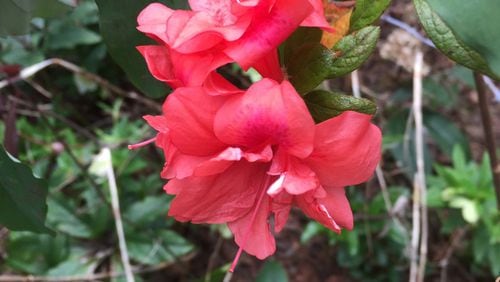Q: I received an azalea after the death of my father. The label says "Place in a cool location, avoiding excessively hot and cold areas." Does this mean I can't plant it outside? Mary Johnston, email
A: In my experience florist azaleas are not as winter hardy as the regular Asian azaleas we see so commonly in spring. These gift plants have been bred for eye-catching flowers, not outdoor hardiness. It's possible to plant a florist azalea in a large pot and then bring it in for winter after being on a patio for summer. With reasonable care it will bloom in the pot in spring.
Q: We bought a spruce tree at a big box store and planted it a year ago after Christmas. It was growing throughout the year but just recently began drying out top and bottom. Jim Cannone, email
A: Spruce trees rarely survive here for long. In my opinion, they should not be sold or planted in this part of the state. They are all adapted more to the mountains of North Georgia than to the suburbs of Atlanta. If you are stubborn and want to experiment, choose a site that gets morning sunshine and afternoon shade. The site should have a slight slope, to help water move away from the roots. Use a shovel to loosen the soil twelve inches deep in a planting area eight feet across. Remove one third of the soil in the area and replace it with gritty sand, such as paver leveling sand. Thoroughly mix it into the soil. If the soil was mostly clay to begin with, mix in four cubic feet of soil conditioner. After planting, water deeply once each week for a year, particularly during the summer. Following these steps will give you at least a 50 percent chance that your spruce will survive for a decade or more.
Q: I heard you talking about using shingles to warm up the ground around your tomatoes. Shingles sound like the perfect weed barrier: won't blow away, won't deteriorate, heat up the soil, etc. But are there toxic chemicals in them that would leach into soil? Mike Childers, email
A: I had no problems doing it last year and my tomatoes looked healthy. People do wonder about the toxicity of shingles but they forget that most rain barrels collect water that runs across their home's shingles and they then use that water on their vegetables. I don't think there's anything particularly toxic in shingles used to achieve early soil warming in the garden.
Q: Everyone says that ivy will die if you cut it off at the base. But this has been done on some large trees in my yard and that darn ivy is still alive after a year! Lou Overman, email
A: It may take longer than you expect but if the ivy vine is clipped at the base it will eventually die. English ivy is not parasitic and does not absorb water or nutrients from the tree. Examine the trunk closely to make sure there are absolutely no vines that are uncut.
About the Author






